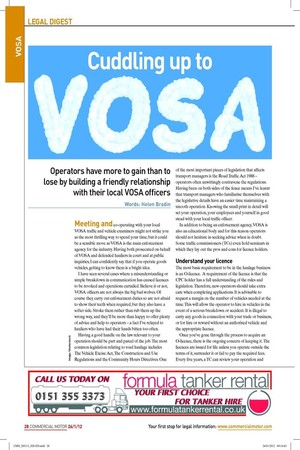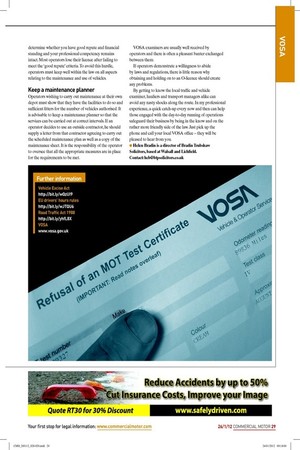Cuddling up to
Page 21

Page 22

If you've noticed an error in this article please click here to report it so we can fix it.
Operators have more to gain than to lose by building a friendly relationship with their local VOSA officers
Words: Helen Bradin
Meeting and co-operating with your local VOSA trafic and vehicle examiners might not strike you as the most thrilling way to spend your time, but it could be a sensible move as VOSA is the main enforcement agency for the industry. Having both prosecuted on behalf of VOSA and defended hauliers in court and at public inquiries, I can conidently say that if you operate goods vehicles, getting to know them is a bright idea.
I have seen several cases where a misunderstanding or simple breakdown in communication has caused licences to be revoked and operations curtailed. Believe it or not, VOSA oficers are not always the big bad wolves. Of course they carry out enforcement duties so are not afraid to show their teeth when required, but they also have a softer side. Stroke them rather than rub them up the wrong way, and they’ll be more than happy to offer plenty of advice and help to operators – a fact I’ve relayed to hauliers who have had their hands bitten too often.
025 10/11/11 1453 P
Having a good handle on the law relevant to your
1
operation should be part and parcel of the job. The most common legislation relating to road haulage includes The Vehicle Excise Act, The Construction and UseRegulations and the Community Hours Directives. One
Image: Shutterstock
0
Image:Shutterstock of the most important pieces of legislation that affects transport managers is the Road Trafic Act 1988 – operators often unwittingly contravene the regulations. Having been on both sides of the fence means I’ve learnt that transport managers who familiarise themselves with the legislative details have an easier time maintaining a smooth operation. Knowing the small print in detail will set your operation, your employees and yourself in good stead with your local trafic oficer.
In addition to being an enforcement agency, VOSA is also an educational body and for this reason operators should not hesitate in seeking advice when in doubt. Some trafic commissioners (TCs) even hold seminars in which they lay out the pros and cons for licence holders.
Understand your licence
The most basic requirement to be in the haulage business is an O-licence. A requirement of the licence is that the CPC holder has a full understanding of the rules and legislation. Therefore, new operators should take extra care when completing applications. It is advisable to request a margin on the number of vehicles needed at the time. This will allow the operator to hire in vehicles in the event of a serious breakdown or accident. It is illegal to carry any goods in connection with your trade or business, or for hire or reward without an authorised vehicle and the appropriate licence.
Once you’ve gone through the process to acquire an O-licence, there is the ongoing concern of keeping it. The licences are issued for life unless you operate outside the terms of it, surrender it or fail to pay the required fees. Every ive years, a TC can review your operation and determine whether you have good repute and inancial standing and your professional competency remains intact. Most operators lose their licence after failing to meet the ‘good repute’ criteria. To avoid this hurdle, operators must keep well within the law on all aspects relating to the maintenance and use of vehicles.
Keep a maintenance planner
Operators wishing to carry out maintenance at their own depot must show that they have the facilities to do so and suficient itters for the number of vehicles authorised. It is advisable to keep a maintenance planner so that the services can be carried out at correct intervals. If an operator decides to use an outside contractor, he should supply a letter from that contractor agreeing to carry out the scheduled maintenance plan as well as a copy of the maintenance sheet. It is the responsibility of the operator to oversee that all the appropriate measures are in place for the requirements to be met. VOSA examiners are usually well received by operators and there is often a pleasant banter exchanged between them.
If operators demonstrate a willingness to abide by laws and regulations, there is little reason why obtaining and holding on to an O-licence should create any problems.
By getting to know the local trafic and vehicle examiner, hauliers and transport managers alike can avoid any nasty shocks along the route. In my professional experience, a quick catch-up every now and then can help those engaged with the day-to-day running of operations safeguard their business by being in the know and on the rather more friendly side of the law. Just pick up the phone and call your local VOSA ofice – they will be pleased to hear from you.
• Helen Bradin is a director of Bradin Trubshaw Solicitors, based at Walsall and LichSeld. Contact: hcb@btpsolicitors.co.uk











































